The sizeof operator returns an integer of type size_t, so you should use the appropriate printf format specifier ("%zu") (assuming C99):
printf(
"%zu %zu %zu %zu %zu %zu %zu %zu %zu\n",
sizeof(char), sizeof(unsigned char),
sizeof(int), sizeof(unsigned int),
sizeof(long), sizeof(unsigned long),
sizeof(float), sizeof(double), sizeof(long double)
);
However, this prints the number of bytes in each type. If you want the number of bits in each type, include <limits.h> and multiply each result by CHAR_BIT to get that:
#include <limits.h>
/* ... */
printf(
"%zu %zu %zu %zu %zu %zu %zu %zu %zu\n",
sizeof(char) * CHAR_BIT, sizeof(unsigned char) * CHAR_BIT,
sizeof(int) * CHAR_BIT, sizeof(unsigned int) * CHAR_BIT,
sizeof(long) * CHAR_BIT, sizeof(unsigned long) * CHAR_BIT,
sizeof(float) * CHAR_BIT, sizeof(double) * CHAR_BIT, sizeof(long double) * CHAR_BIT
);
IMO, it would look much clearer if you label what you're printing and print each value on its own line, like this:
printf("Number of bits in char = %zu\n", sizeof(char) * CHAR_BIT);
printf("Number of bits in unsigned char = %zu\n", sizeof(unsigned char) * CHAR_BIT);
printf("Number of bits in int = %zu\n", sizeof(int) * CHAR_BIT);
printf("Number of bits in unsigned int = %zu\n", sizeof(unsigned int) * CHAR_BIT);
printf("Number of bits in long = %zu\n", sizeof(long) * CHAR_BIT);
printf("Number of bits in unsigned long = %zu\n", sizeof(unsigned long) * CHAR_BIT);
printf("Number of bits in float = %zu\n", sizeof(float) * CHAR_BIT);
printf("Number of bits in double = %zu\n", sizeof(double) * CHAR_BIT);
printf("Number of bits in long double = %zu\n", sizeof(long double) * CHAR_BIT);
And that can be reduced with a macro (though macros aren't the best, they are useful for repetitive code):
#define PRINT_BITS_IN_TYPE(type) \
printf("Number of bits in " #type " = %zu\n", sizeof(type) * CHAR_BIT)
PRINT_BITS_IN_TYPE(char);
PRINT_BITS_IN_TYPE(unsigned char);
PRINT_BITS_IN_TYPE(int);
PRINT_BITS_IN_TYPE(unsigned int);
PRINT_BITS_IN_TYPE(long);
PRINT_BITS_IN_TYPE(unsigned long);
PRINT_BITS_IN_TYPE(float);
PRINT_BITS_IN_TYPE(double);
PRINT_BITS_IN_TYPE(long double);
